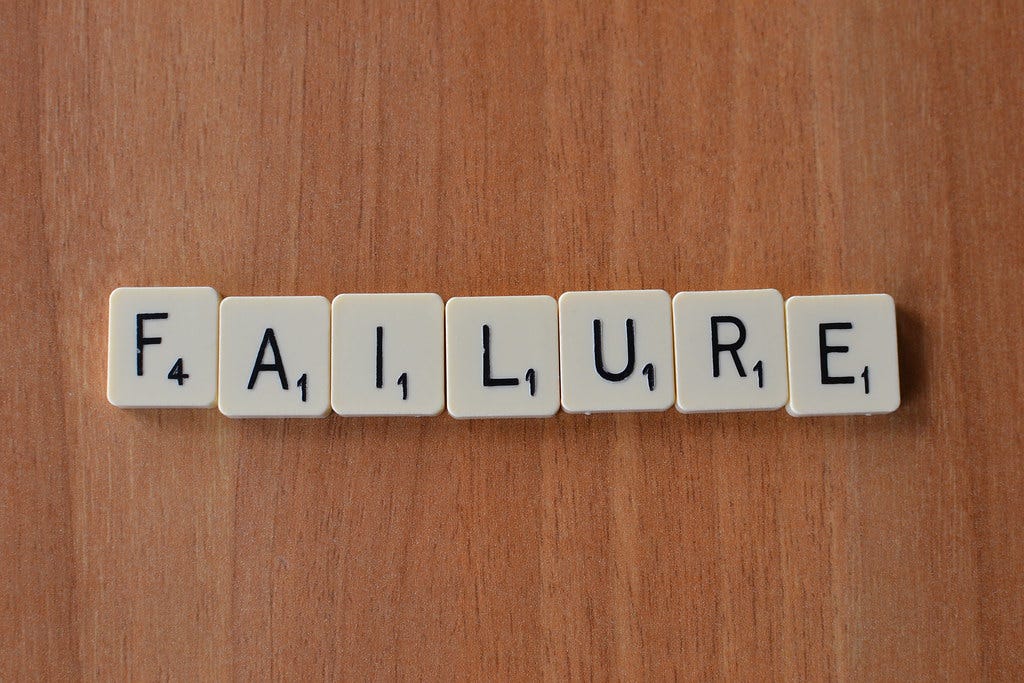The World’s Oldest Living Land Animal, a Tortoise Named Jonathan, Turns 191 Smithsonian Mag
Genes That Boost Fertility Also Shorten Our Life, Study Suggests New York Times
Polyethylene waste could be a thing of the pastPhys.org
John Inazu (Washington University; Google Scholar), Learning from Failure:
Learning from Failure
Success for most people doesn't come naturally--or at least not without failure

Earlier this month, I highlighted a day I spent with a group of medical professionals at Mayo Clinic. One striking aspect of the formal and informal discussions were references to publicly sharing failures. For example, one medical school holds an annual session where senior physicians share their failure stories, which often resulted in the deaths of patients. At dinner, another physician shared a similar session that takes place at his annual specialty conference.
It occurred to me that other professional circles could probably benefit from their own “failure sessions.”
It occurred to me that other professional circles could probably benefit from their own “failure sessions.”
Last month, Jancee Dunn wrote a New York Times newsletter about failure as a precondition to thriving. Dunn interviewed Amy Edmondson, a professor of leadership at Harvard Business School, who suggested that we can learn from our missteps if we put our failures in context, learn how to pivot, and encourage sharing our failures with others. Dunn adds:
In the spirit of failure sharing, here are a few of mine. I flunked the test to get my driver’s license three times. I was fired from Burger King for not filling sodas fast enough.
And, as an author, I have done several readings where no one showed up. At my last one, a man wandered in and sat in one of the empty chairs. After a few more minutes of waiting in vain for more people, I asked the man if he’d like me to begin my reading.
He explained that he was sitting there only because his feet hurt. “Actually,” he said, “I’d prefer that you didn’t read.”
At the same time, there’s a difference between people who fail but ultimately succeed and those who those who do not overcome failure. As an article in the Scientific American noted a few years ago, “the people who eventually succeeded and the people who eventually failed tried basically the same number of times to achieve their goals. It turns out that trying again and again only works if you learn from your previous failures.”
Speaking with the medical professionals at Mayo, I was struck by how countercultural it is in medicine—or law—to highlight failures. Professionals in both settings would much rather project strength and competence than admit that most people, even highly successful people, encounter their share of failures. But this tendency is shortsighted for at least two reasons. First, younger professionals are inculcated into a world that hides or downplays failure rather than one that normalizes it. Second, as most successful professionals will tell you, there is a lot that can be learned from past mistakes.
I recently participated in a small dinner of writers and institutional leaders. As we began our time together, I invited each person to share with the group an experience of either a challenge or a failure. Everyone in the room shared a failure. The collective experience of hearing these stories was profoundly moving, and it connected us far better than if we had all shared challenges.
There is a bit of an art to sharing real failure stories. You should avoid the urge to mask hero stories as failure stories—the narratives of tricky or even embarrassing situations where you look good in the end. We’ve all seen these self-serving narratives akin to The Office’s Michael Scott admitting his greatest weaknesses: “I work too hard, I care too much and sometimes I can be too invested in my job.”
You should also distinguish failure stories from victim stories. The setbacks from these two kinds of stories may be similar, and people can learn from both kinds of situations. But failure stories are more about how you have fallen short rather than how others have fallen short or have wronged you. ...
I don’t think there’s any recipe for when, with whom, or how to share failure stories. But I do think we should be sharing them, and learning from them.
Other posts by John Inazu:
- Nii Addy: Christian. Black. Neuroscientist.(Oct. 15, 2023)
- The Bad News About Politics Without Religion (Sept. 17, 2023)
- Reflections On Mortality: Does Christianity Matter? (July 9, 2023)
- DEI Needs Religious Diversity Too (Apr. 16, 2023)
- Kicking Off The Legal Vocation Fellowship For Early-Career Christian Attorneys (Feb. 26, 2023)
- What The Left And The Right Get Wrong About The 'He Gets Us' Super Bowl Jesus Ads (Feb. 19, 2023)
- How Can Christian Faculty Be Interfaith Leaders? (Dec. 18, 2022)
- The Respect For Marriage Act, Christianity, And Pluralism (Dec. 4, 2022)
- Tim Keller On Forgiveness (Nov. 20, 2022)
- The Incomprehensible Witness Of Forgiveness (Nov. 13, 2022)
- Pandemic Forgiveness (Nov. 6, 2022)
- The Life We're Looking For (Sept. 25, 2022)
- On The 21-Year Anniversary Of 9/11, What Unites Us? (Sept. 11, 2022)
- Interfaith Doesn't Mean Compromise (Aug. 28, 2022)

